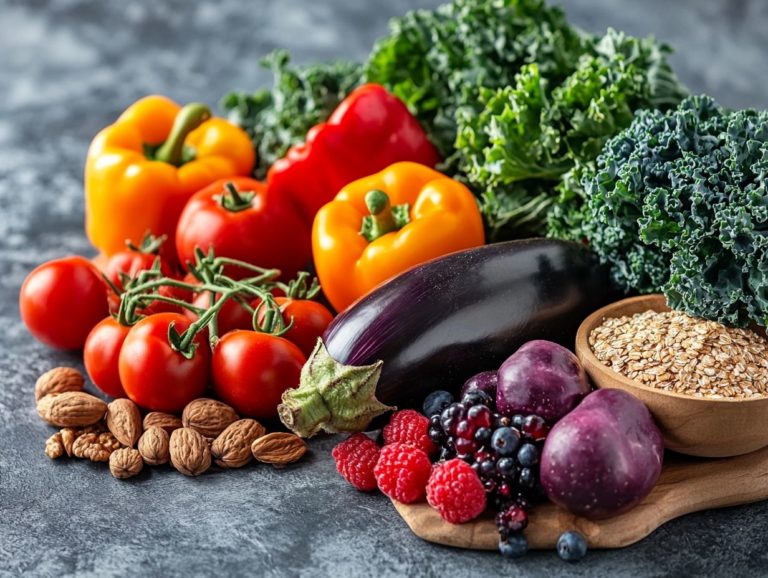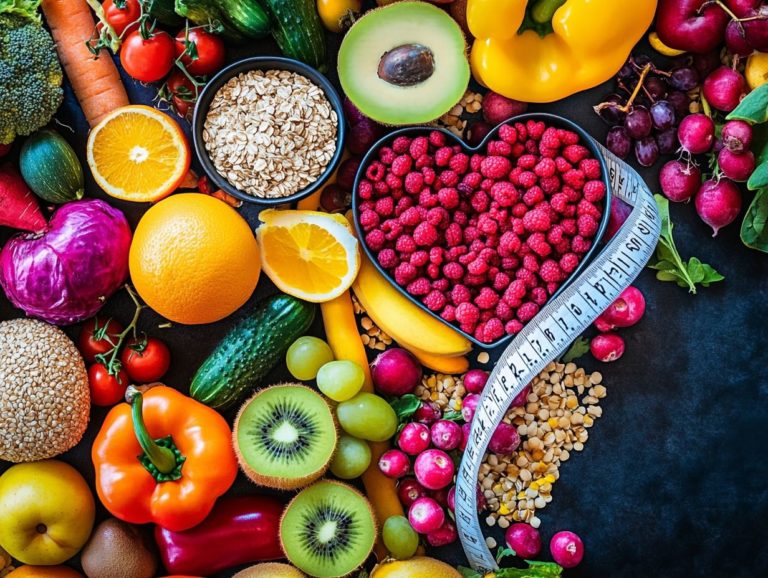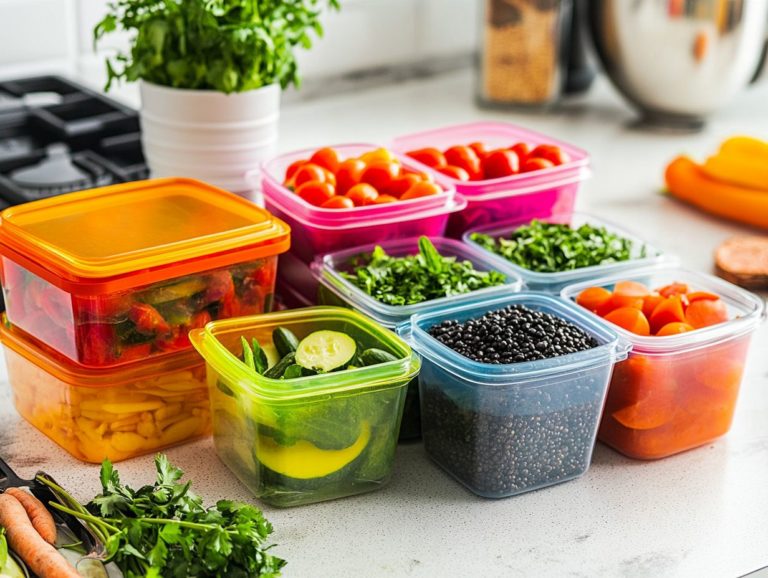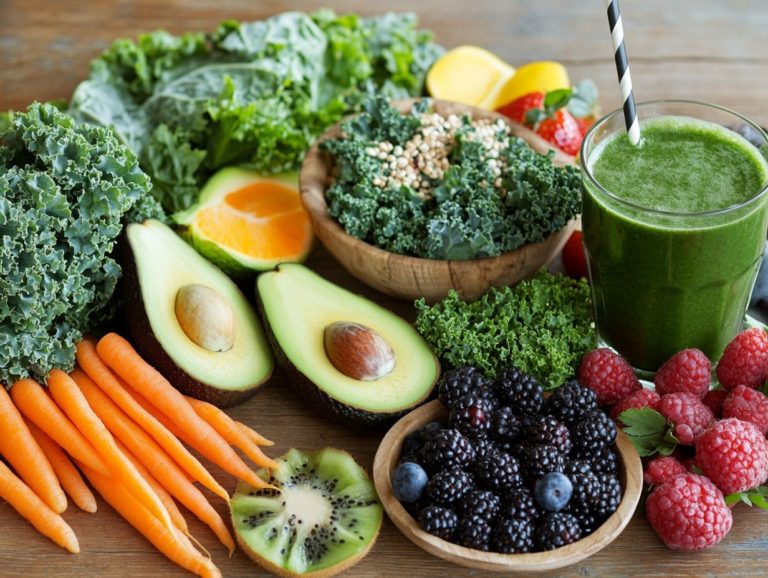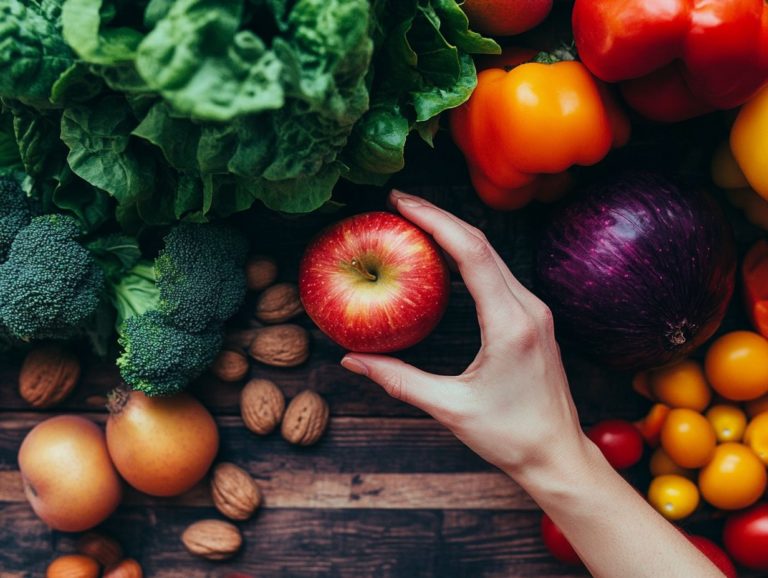How to Create a Sustainable Eating Plan
In a world that’s becoming ever more conscious of how your choices shape both your health and the environment, following a sustainable diet is essential now more than ever.
This approach not only enhances your personal well-being but also encourages environmentally friendly habits that can make a real difference.
You ll discover practical tips to make a difference today! You ll explore essential factors to consider, along with strategies for incorporating plant-based and locally sourced foods into your diet.
Effective meal planning strategies that reduce waste will also be covered.
By the time you finish, you ll be equipped with the knowledge to implement lasting changes that benefit both you and the planet.
Contents
- Key Takeaways:
- The Importance of a Sustainable Eating Plan
- Factors to Consider When Creating a Sustainable Eating Plan
- Tips for Building a Sustainable Eating Plan
- Meal Planning for Sustainability
- Staying Committed to a Sustainable Eating Plan
- Preguntas Frecuentes
- C mo puedo crear un plan de alimentaci n sostenible sin sacrificar el sabor y la variedad?
- Cu les son algunos consejos para la planificaci n de comidas que aseguren la sostenibilidad?
- Es posible crear un plan de alimentaci n sostenible con un presupuesto limitado?
- C mo puedo asegurarme de que mi plan de alimentaci n sostenible sea respetuoso con el medio ambiente?
- Puedo comer fuera y mantener un plan de alimentaci n sostenible?
- C mo manejo los antojos y me mantengo en la ruta con mi plan de alimentaci n sostenible?
Key Takeaways:
- A sustainable eating plan benefits your health and the environment.
- Consider your dietary preferences and the environmental impact of your food choices.
- Incorporate more plant-based and locally sourced foods.
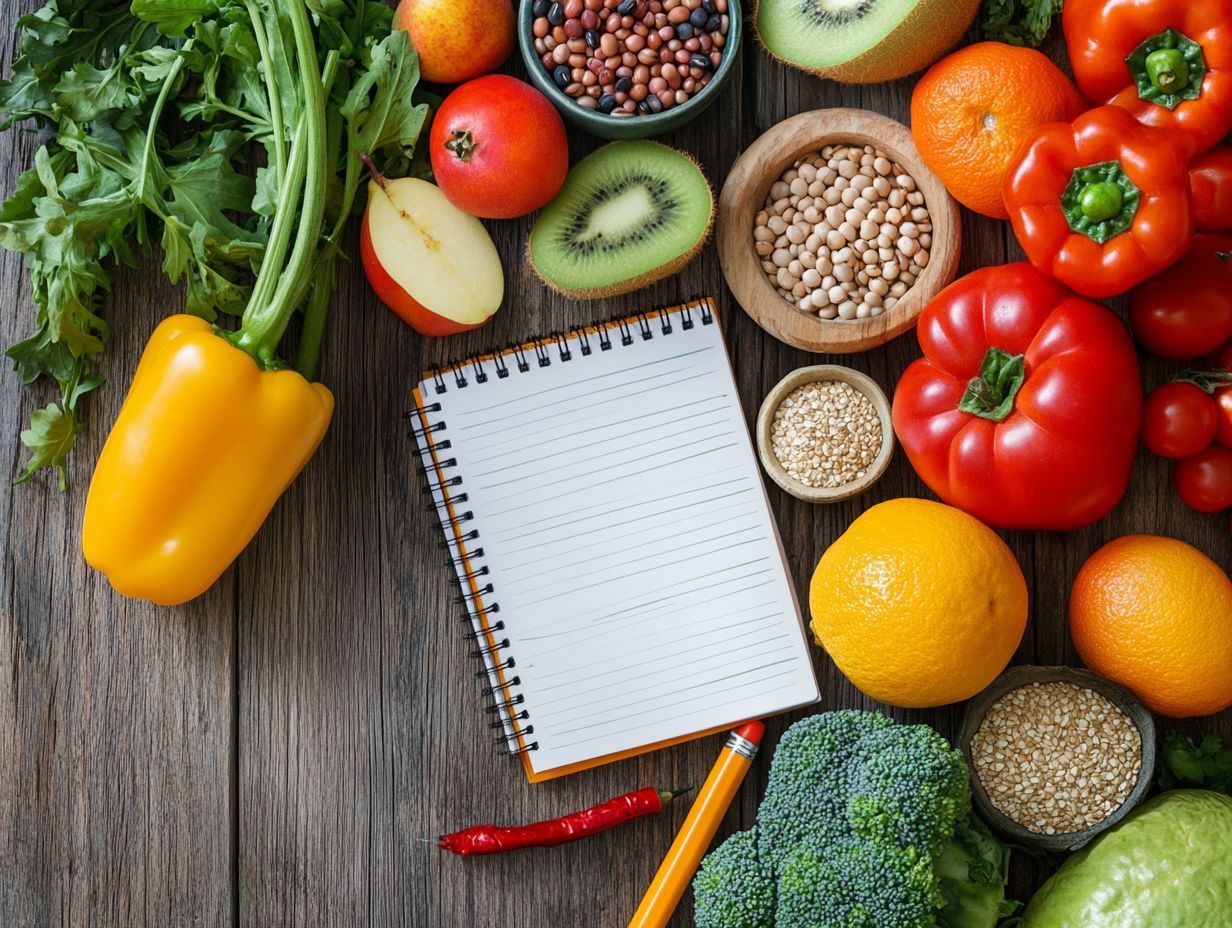
The Importance of a Sustainable Eating Plan
A sustainable eating plan is essential for nurturing both your personal health and the well-being of our planet, and learning how to create a weekly meal plan that works can help you achieve this.
By prioritizing a sustainable diet rich in local produce, whole grains, and plant-based foods, you can effectively combat climate change, reduce greenhouse gas emissions, and enhance food security.
Embracing diverse diets, such as the Mediterranean diet which focuses on fruits, vegetables, whole grains, and healthy fats and flexitarian diets not only fosters healthier eating habits but also minimizes food waste.
This holistic approach nourishes your body while supporting a resilient food system that will benefit future generations.
Benefits for Health and the Environment
A sustainable diet presents a wealth of benefits for both your health and the environment, encouraging you to adopt practices that foster healthy eating while minimizing your ecological footprint.
By embracing a diverse array of whole grains, fruits, and vegetables, you can significantly elevate your nutritional intake. These choices not only supply essential vitamins and minerals but also bolster your long-term health by lowering the risk of chronic illnesses like heart disease and diabetes.
Committing to responsible seafood consumption and leaning towards a predominantly plant-based diet can reduce greenhouse gas emissions, playing a vital role in the fight against climate change.
Minimizing food waste through thoughtful meal planning further supports a healthier planet, making a sustainable diet a critical step toward both personal well-being and environmental stewardship.
Factors to Consider When Creating a Sustainable Eating Plan
When crafting a sustainable eating plan, consider several key factors. Reflect on your dietary preferences, assess the environmental impact of your choices, and prioritize the use of local produce. Additionally, learning how to develop a balanced eating routine can help you effectively minimize food waste.
Dietary Preferences and Restrictions
Understanding your dietary preferences and restrictions is crucial when crafting a sustainable diet that accommodates diverse needs, including options like the flexitarian and Mediterranean diets.
These choices not only reflect your personal values but also play a significant role in promoting environmental sustainability.
As a flexitarian, you can strike a balance by primarily enjoying plant-based foods while occasionally indulging in meat. This approach allows you to savor a variety of meals without deviating from eco-friendly practices.
Conversely, the Mediterranean diet boasts numerous health benefits, such as enhanced heart health and reduced risks of chronic diseases.
By exploring these options, you can make informed choices that align with both your health aspirations and environmental considerations.
Environmental Impact of Food Choices

The environmental impact of your food choices plays a crucial role in crafting a sustainable diet. Certain foods are significant contributors to climate change and greenhouse gas emissions.
Take, for example, the production of animal proteins, particularly beef and dairy. These foods generate substantial amounts of methane, a potent greenhouse gas. The cultivation of palm oil has led to widespread deforestation as well.
This deforestation contributes to the loss of biodiversity and vital carbon storage. By recognizing these detrimental effects, you can make informed dietary choices that prioritize sustainability.
Transitioning to plant-based alternatives, reducing your overall consumption of animal products, and supporting sustainable palm oil initiatives are all effective strategies. This shift not only aids in lowering your carbon footprint. It also fosters a healthier food system for generations to come.
Tips for Building a Sustainable Eating Plan
Crafting a sustainable eating plan involves embracing practical strategies. Consider incorporating more plant-based foods, prioritizing local and seasonal produce, and following how to make a meal plan that fits your lifestyle to adopt the principles of clean eating.
These steps enhance your meals. They also contribute to a more environmentally friendly lifestyle.
Incorporating More Plant-Based Foods
Incorporating more plant-based foods into your sustainable diet can elevate your overall nutrition while minimizing your environmental footprint.
By embracing whole grains, legumes, fresh fruits, and vibrant vegetables, you can transform your everyday meals into nutrient-dense options. These choices enhance your health and well-being.
For example, swapping out refined grains for quinoa or brown rice boosts your fiber intake. It also delivers essential amino acids your body craves.
Further enriching your diet with a variety of legumes, like lentils and chickpeas, can elevate your protein levels. This helps you feel satisfied for longer.
Focusing on seasonal fruits and colorful veggies diversifies your palate. It infuses your meals with a wealth of antioxidants and vitamins.
By switching to a plant-based diet, you can dramatically lower greenhouse gas emissions and save water. This change is crucial for protecting our planet!
Choosing Locally Sourced and Seasonal Foods
Choosing locally sourced and seasonal foods is essential for crafting a sustainable diet. This approach enhances food security while minimizing waste.
When you opt for these options, you support local farmers and economies. You also reduce the carbon footprint tied to long-distance food transportation.
Fresh produce at its peak season bursts with flavor and nutrition. This elevates your overall dining experience.
Engaging with community-supported agriculture programs or visiting farmers’ markets opens up a world of seasonal delights. This fosters a genuine connection between you and the producers.
Such connections contribute to a more resilient local food system. They also champion environmentally friendly practices like organic farming and farming that improves soil health and increases biodiversity.
Meal Planning for Sustainability
Effective meal planning is crucial for sustainability. It helps you minimize food waste while ensuring balanced and nutritious meals that align seamlessly with clean eating principles.
Strategies for Reducing Food Waste

Implementing effective strategies to reduce food waste is essential for a sustainable diet. This reinforces the principles of meal planning and clean eating.
By focusing on practical approaches, you can elevate your commitment to sustainability while savoring delicious meals. Proper storage techniques are crucial for extending the life of perishable items.
For instance, using airtight containers can significantly cut down on spoilage. Additionally, creatively repurposing leftovers minimizes waste and ignites your culinary creativity.
Turning last night s dinner into today s delightful lunch is a great way to make the most of your ingredients.
Adopting mindful purchasing practices like crafting a detailed shopping list ensures that you acquire only what you truly need. This effectively reduces the risk of excess that often leads to waste.
Creating Balanced and Nutritious Meals
Creating balanced and nutritious meals is essential for a sustainable diet. It s important to incorporate whole grains, fruits, and vegetables into your daily routine.
These elements provide essential vitamins and minerals along with the fiber that supports digestive health. Lean proteins and healthy fats are crucial for maintaining energy levels and keeping hunger at bay. This ensures that your meals are both nourishing and satisfying.
Understanding the nutritional benefits of various food groups helps you craft meals that fuel your body effectively. Embracing effective nutrition communication can guide your choices toward healthier options while promoting sustainability in food production and consumption.
By fostering awareness of balanced eating principles, you and your community can enjoy improved health and environmental responsibility.
Staying Committed to a Sustainable Eating Plan
Staying committed to a sustainable eating plan requires mindfulness and dedication, especially as you face challenges in your pursuit of long-term change.
Overcoming Challenges and Maintaining Long-Term Change
Overcoming challenges in maintaining a sustainable diet is vital for achieving long-term change and ensuring food security for everyone.
You may encounter hurdles like limited access to fresh produce, high prices for organic options, and a lack of knowledge about preparing sustainable meals.
Explore local farm programs today for fresh, affordable produce. Engaging in nutrition workshops can boost your awareness and cooking skills, turning what might feel overwhelming into an enjoyable experience.
Open communication about nutrition and sustainability helps you prioritize these values in daily life, leading to healthier choices and stronger community support.
Preguntas Frecuentes
C mo puedo crear un plan de alimentaci n sostenible sin sacrificar el sabor y la variedad?
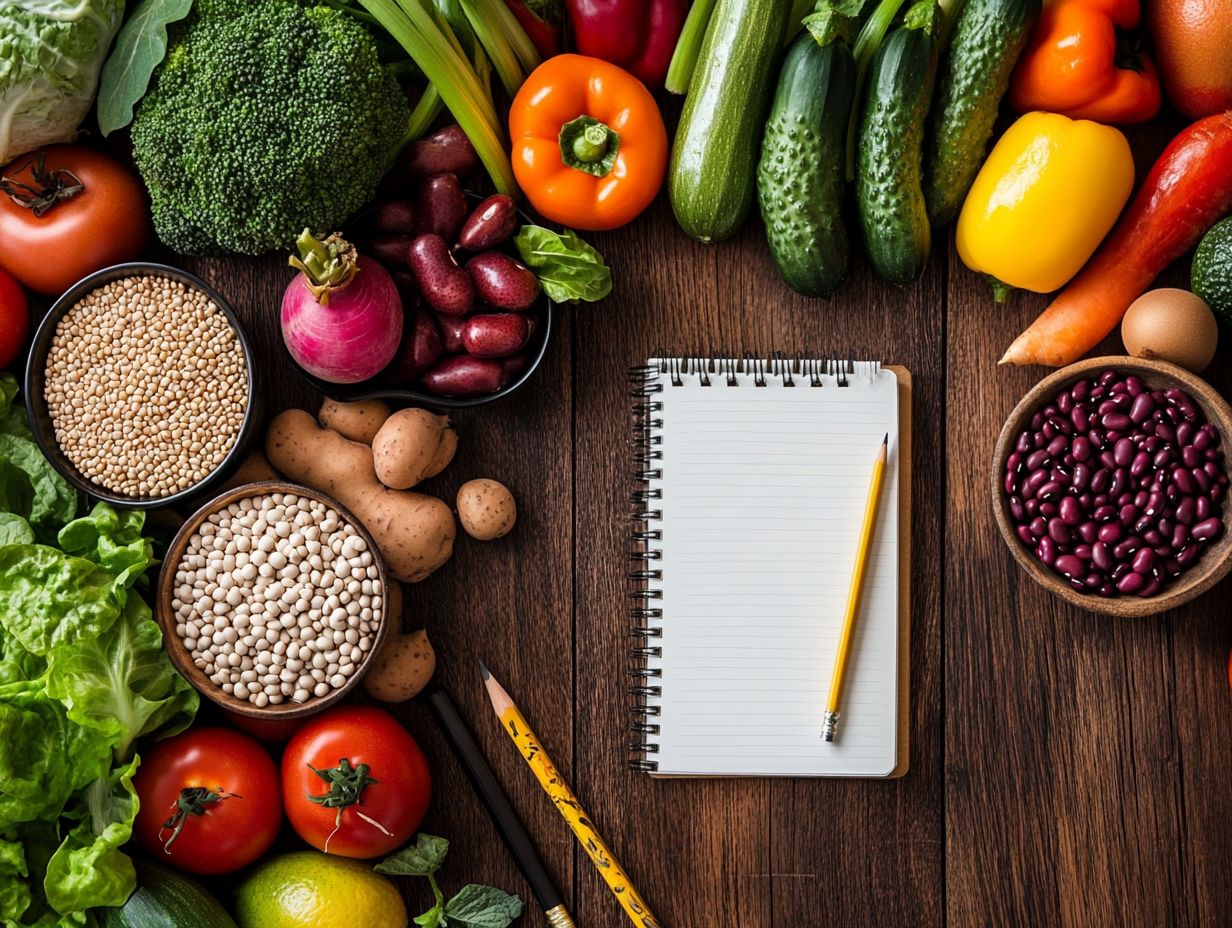
Para crear un plan de alimentaci n sostenible, conc ntrate en incluir una variedad de alimentos integrales, como frutas, verduras, granos enteros y prote nas magras. Experimenta con diferentes especias y combinaciones de sabores para a adir variedad a tus comidas. Prueba nuevas recetas y cocinas para mantener las cosas interesantes.
Cu les son algunos consejos para la planificaci n de comidas que aseguren la sostenibilidad?
Al planificar comidas, incluye un equilibrio de todos los grupos de alimentos y usa productos de temporada y locales. Planea comidas que se puedan hacer con antelaci n y almacenar para los d as ocupados. Intenta incorporar las sobras de una comida en la del d a siguiente para reducir el desperdicio de alimentos.
Es posible crear un plan de alimentaci n sostenible con un presupuesto limitado?
S , es posible. Busca ofertas en productos frescos, elige frutas y verduras de temporada y compra al por mayor cuando sea posible. Opta por frutas y verduras congeladas, que son m s asequibles y nutritivas. Limita los alimentos procesados, que suelen ser m s costosos.
C mo puedo asegurarme de que mi plan de alimentaci n sostenible sea respetuoso con el medio ambiente?
Para un plan de alimentaci n respetuoso con el medio ambiente, elige alimentos de origen local y de temporada. Esto reduce la huella de carbono. Opta por alimentos de origen sostenible y org nicos siempre que puedas. Limitar los productos animales y optar por opciones basadas en plantas tambi n es m s respetuoso con el medio ambiente.
Comienza hoy tu viaje hacia un plan de alimentaci n sostenible y descubre recursos valiosos que te inspirar n!
Puedo comer fuera y mantener un plan de alimentaci n sostenible?
Absolutamente! Al comer fuera, elige alimentos basados en plantas y evita el desperdicio. Intenta pedir opciones sostenibles en los restaurantes locales.
C mo manejo los antojos y me mantengo en la ruta con mi plan de alimentaci n sostenible?
Es emocionante mantener un enfoque equilibrado en tu alimentaci n. Perm tete disfrutar con moderaci n e incorpora peque os caprichos en tu dieta.
Encuentra alternativas m s saludables a tus antojos, como papas fritas de batata al horno en lugar de las fritas de comida r pida. Recuerda que la sostenibilidad se trata de h bitos a largo plazo, as que no seas demasiado duro contigo mismo.

